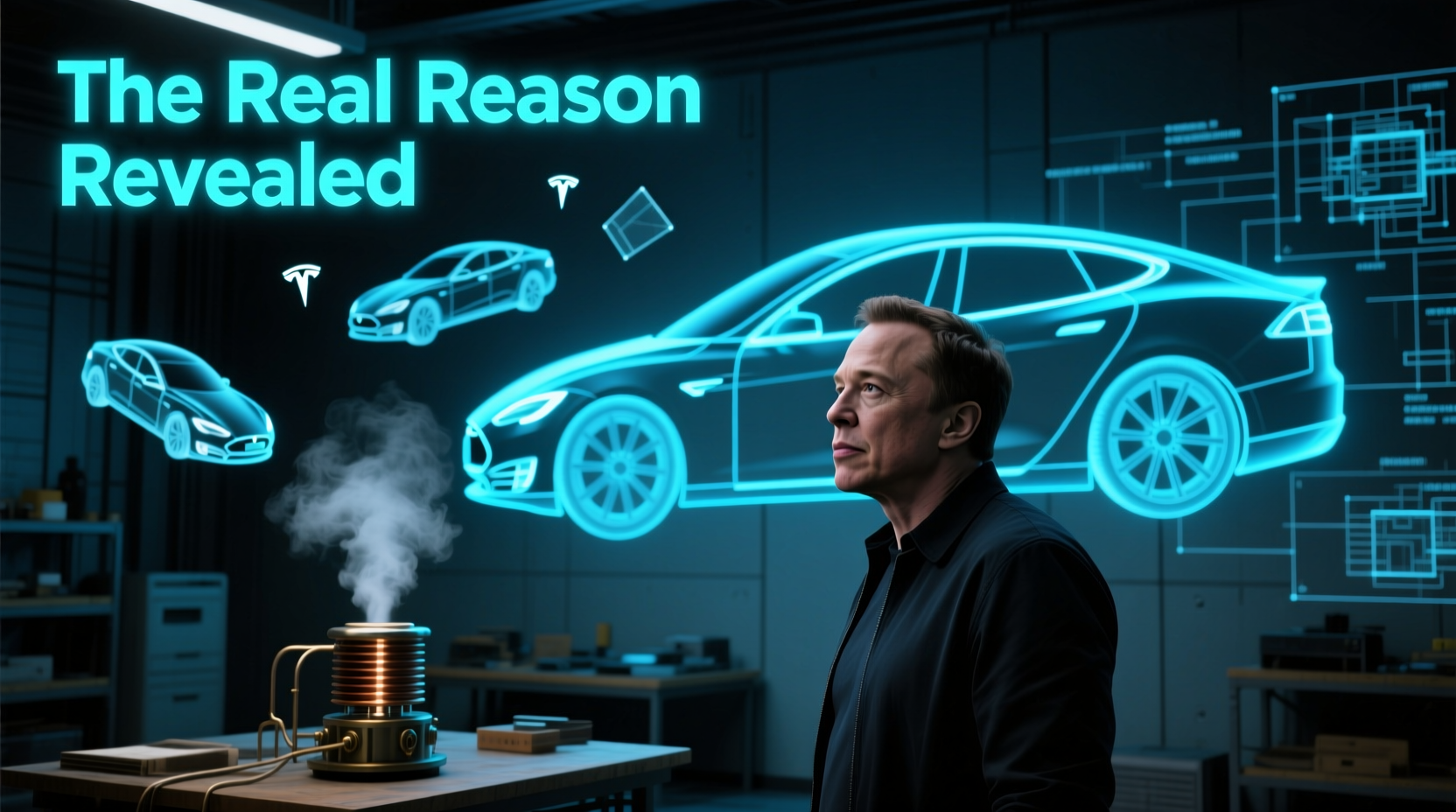When Tesla Motors launched in 2003, it didn’t just introduce a new electric car—it redefined an entire industry. But long before the Model S turned heads or Autopilot made headlines, there was a simple yet profound decision: what to call the company. The answer—Tesla—wasn’t arbitrary. It honored a visionary scientist from the past while signaling a bold leap into the future. While many assume the name pays tribute to Nikola Tesla, the full story runs deeper than admiration. It’s a fusion of legacy, innovation, and strategic branding that reflects Elon Musk’s broader mission for sustainable energy.
The Origin: A Tribute to Nikola Tesla

Nikola Tesla, the Serbian-American inventor, electrical engineer, and futurist, pioneered alternating current (AC) electricity systems—the foundation of modern power grids. Despite dying in relative obscurity, his contributions to electromagnetism and wireless communication have since been recognized as revolutionary. Elon Musk has consistently expressed deep respect for Tesla, calling him “one of the greatest inventors of all time.” Naming the company after him wasn’t just homage—it was a declaration of intent.
Musk didn’t found Tesla, Inc. (originally Tesla Motors), but he joined early as an investor and later became its most visible leader. The original founders—Martin Eberhard and Marc Tarpenning—chose the name before Musk’s involvement. However, Musk embraced it fully and amplified its significance through public statements and product design choices.
“Tesla is named after Nikola Tesla, who invented the AC induction motor—one of the greatest inventions in history. That motor is what powers our cars today.” — Elon Musk, Interview with Wired, 2015
Technical Legacy: The AC Motor Connection
One of the most concrete reasons for the name lies in engineering. The first Tesla Roadster used a variation of the AC induction motor originally designed by Nikola Tesla in the late 19th century. This motor offered high efficiency, durability, and scalability—perfect for electric vehicles. By using a modernized version of Tesla’s invention, the company created a direct technological lineage between past and present.
This wasn’t symbolic window dressing. It was functional continuity. The very heart of Tesla’s propulsion system traced back to patents filed over a century ago. In this context, naming the company Tesla wasn’t just poetic—it was technically accurate.
Philosophical Alignment: Visionary Thinking and Disruption
Beyond technology, Nikola Tesla embodied the kind of thinking Elon Musk admires: bold, unconventional, and focused on global impact. Tesla dreamed of wireless energy transmission, global communication networks, and renewable power sources—ideas far ahead of his time. Similarly, Musk’s vision extends beyond cars to solar energy, battery storage, and even interplanetary colonization.
The naming decision aligns with Musk’s pattern of honoring disruptive thinkers. SpaceX references space exploration pioneers; Neuralink evokes futuristic brain-machine interfaces; even \"X\" as a rebrand of Twitter nods to the mathematical unknown. Tesla fits this mold—a name associated not just with invention, but with transformation.
By invoking Nikola Tesla, the company positions itself not merely as an automaker, but as a force for systemic change in how humanity produces and consumes energy.
A Strategic Branding Masterstroke
From a marketing perspective, “Tesla” is concise, memorable, and globally recognizable. Unlike generic names like “Electric Motors Inc.,” it carries emotional weight and intellectual prestige. The name suggests sophistication, science, and sustainability—all core values of the brand.
Consider the alternatives. Had the founders chosen something descriptive like “E-Motion” or “VoltAuto,” the brand might have lacked the same gravitas. “Tesla,” however, immediately conjures images of lightning bolts, innovation, and genius.
| Name Option | Pros | Cons |
|---|---|---|
| Tesla Motors | Prestigious association, tech credibility, easy recall | Limited flexibility if expanding beyond vehicles |
| FutureDrive | Modern, forward-looking | No historical anchor, less authenticity |
| Voltpower | Descriptive of function | Generic, lacks uniqueness |
The choice also avoided confusion with existing brands. At the time, “Tesla” had no major automotive associations, making it legally viable and brand-safe. Today, the word is nearly synonymous with cutting-edge EV technology.
Timeline: How the Name Evolved Alongside the Company
The significance of the name has grown as the company expanded its mission. What began as a nod to an inventor became a cornerstone of corporate identity.
- 2003: Tesla Motors founded by Eberhard and Tarpenning, named after Nikola Tesla.
- 2004: Elon Musk leads Series A funding round, becomes chairman of the board.
- 2006: Musk publishes the first “Master Plan,” linking Tesla’s mission to sustainable energy.
- 2016: Company rebrands from Tesla Motors to Tesla, Inc., reflecting expansion into solar and storage.
- 2020s: “Tesla” becomes a verb in pop culture (“Let’s Tesla this problem”) and a symbol of green tech leadership.
Mini Case Study: The Power of a Name in Action
In 2012, when Tesla launched the Model S, skeptics doubted whether consumers would pay $70,000+ for an electric sedan from a startup. Yet pre-orders surged. Analysts noted that the Tesla name played a subtle but powerful role in consumer trust. Focus groups revealed that people associated the brand with intelligence, futurism, and reliability—even if they couldn’t explain why.
One participant said, “I know Nikola Tesla invented electricity… so if they’re named after him, they must know what they’re doing.” While factually oversimplified, this perception illustrates how a well-chosen name can shape public confidence before a single car rolls off the lot.
Common Misconceptions About the Name
Despite widespread knowledge of the Nikola Tesla connection, several myths persist:
- Myth: Elon Musk named the company himself.
Reality: The founders chose the name; Musk endorsed and popularized it. - Myth: The name was chosen solely for marketing.
Reality: It was driven by both technical relevance and genuine admiration. - Myth: Tesla the man had nothing to do with cars.
Reality: While he never built automobiles, his work enabled the motors that make EVs possible.
Checklist: How to Choose a Meaningful Brand Name (Inspired by Tesla)
Building a brand with lasting impact requires more than a catchy sound. Use this checklist when naming your venture:
- ✅ Does it honor a person, idea, or legacy aligned with your mission?
- ✅ Is there a functional or historical link to your product?
- ✅ Is it easy to pronounce and remember globally?
- ✅ Does it stand out in your industry without being gimmicky?
- ✅ Can it scale beyond your initial product offering?
- ✅ Is the domain and trademark available?
Frequently Asked Questions
Did Nikola Tesla ever build electric cars?
No, Nikola Tesla never built an electric car. However, his development of the AC induction motor laid the groundwork for modern EV propulsion systems. Tesla, Inc. uses advanced versions of this motor in its vehicles.
Why didn’t they name it after Elon Musk?
Musk has stated he prefers companies to reflect their mission rather than individual egos. He once said, “I don’t want to name companies after myself—that feels weird.” The focus remains on ideas, not personalities.
Was the name Tesla legally available?
Yes. Although “Tesla” is a common surname and used in other minor businesses, there were no major conflicts in the automotive or energy sectors at the time. The founders secured the rights early, including the web domain teslamotors.com (now tesla.com).
Conclusion: More Than Just a Name
The decision to name the company Tesla was far more than a tribute—it was a strategic alignment of history, technology, and vision. It connected a 21st-century startup to a forgotten genius whose ideas powered the modern world. Under Elon Musk’s leadership, that name evolved into a global symbol of innovation, sustainability, and disruption.
Today, Tesla isn’t just a car company. It’s a movement. And the name—simple, powerful, deeply meaningful—remains at its core. Whether you’re launching a tech startup or rethinking your brand identity, consider what Tesla teaches us: the right name doesn’t just identify—it inspires.









 浙公网安备
33010002000092号
浙公网安备
33010002000092号 浙B2-20120091-4
浙B2-20120091-4
Comments
No comments yet. Why don't you start the discussion?